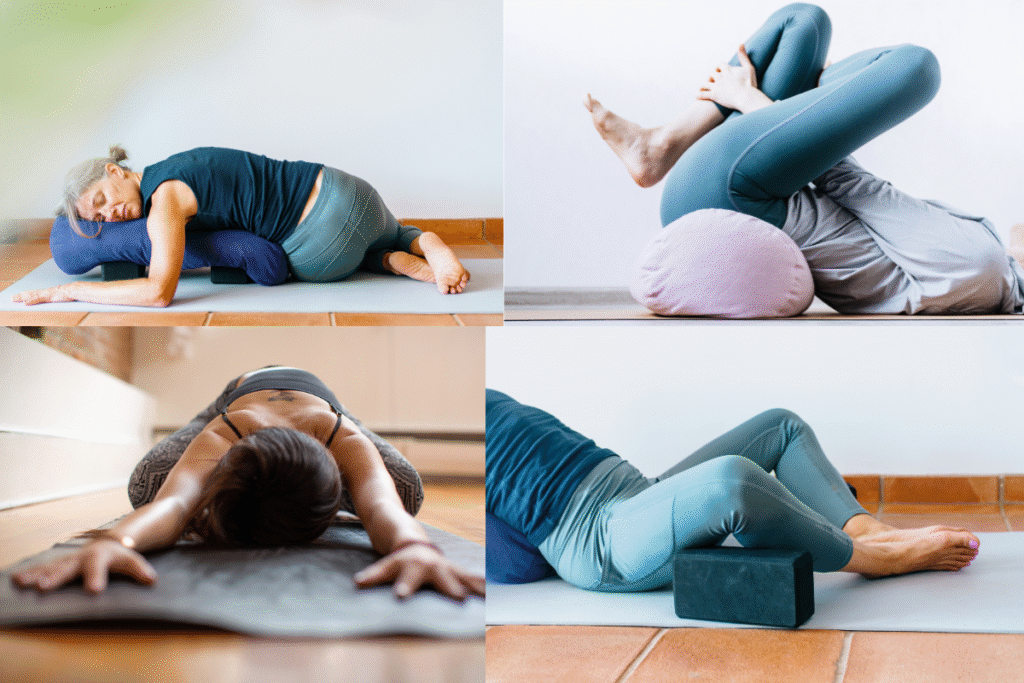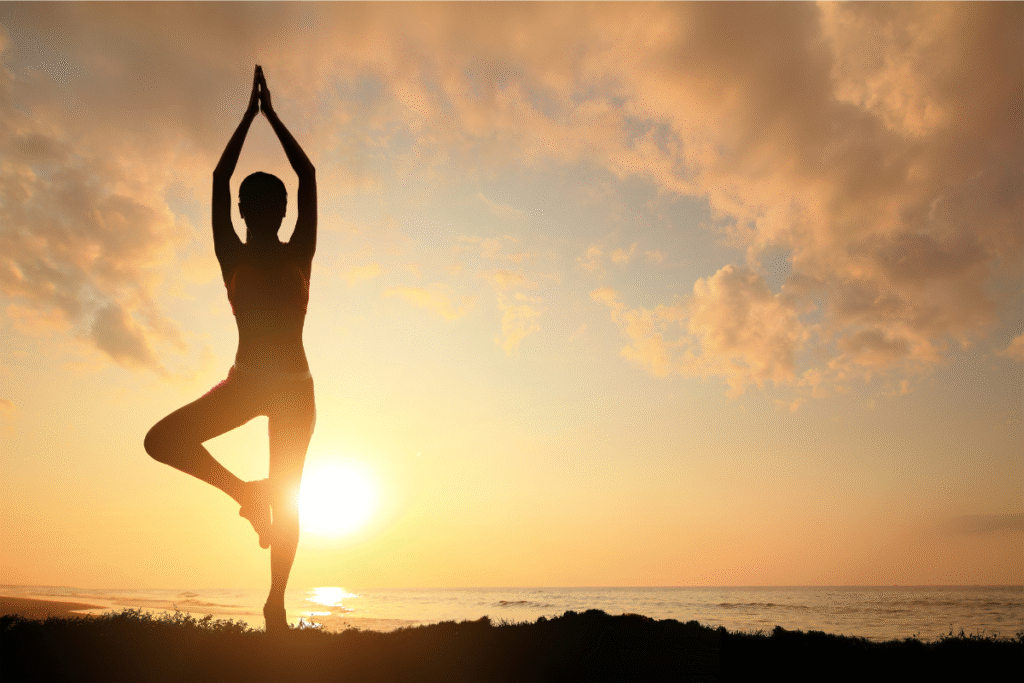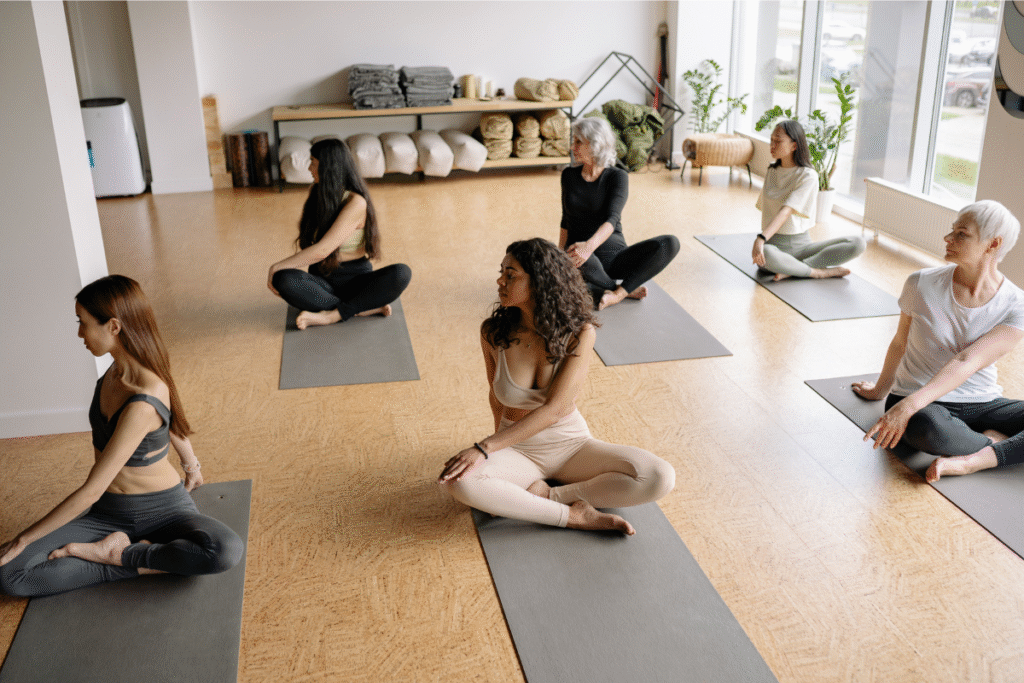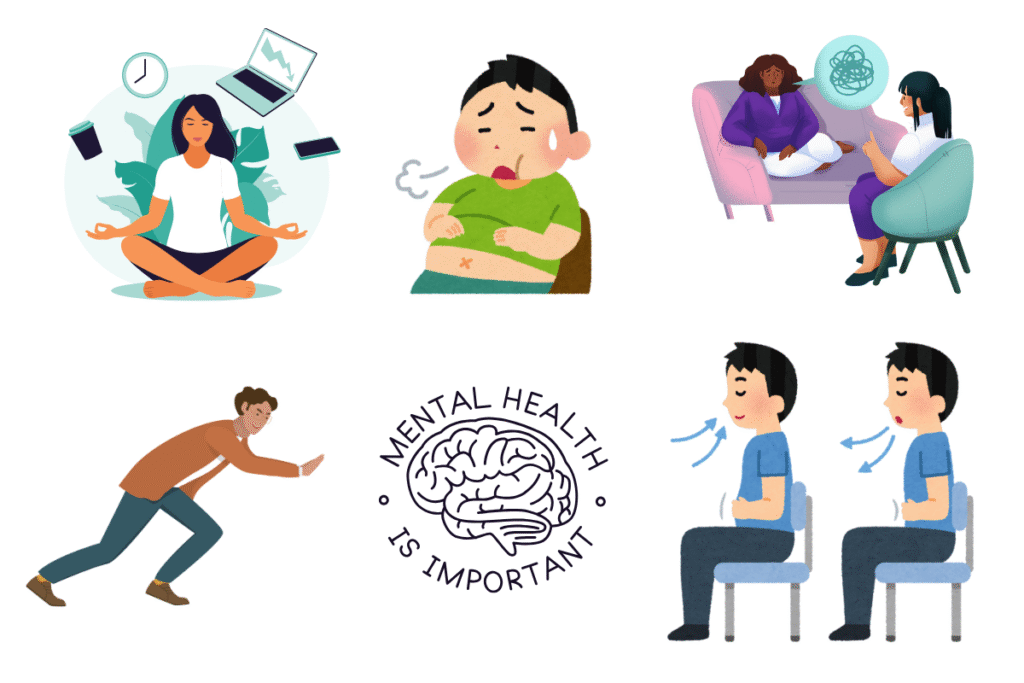BENEFITS FOR STRESS AND ANXIETY

What is Yoga? A Holistic Approach to Mind-Body Wellness
Yoga is much more than poses on a mat. It’s a comprehensive practice that includes:
- Asanas (physical postures)
- Pranayama (breathing techniques)
- Meditation
- Ethical principles (like compassion and non-violence)
Yoga helps calm the nervous system while improving physical health. It fosters a deep connection between breath, body, and mind, making it an excellent tool for managing stress and anxiety naturally.
How Does Yoga Reduce Stress and Anxiety?

Yoga and the Nervous System
When you’re stressed, your sympathetic nervous system (fight or flight) kicks in. Yoga helps activate the parasympathetic nervous system (rest and digest), slowing your heart rate and calming your mind.
Breathwork: Pranayama’s Calming Effects
Breathing exercises, or pranayama, are essential for stress relief. Slow, controlled breaths reduce cortisol levels, ease muscle tension, and help you shift from panic to peace.
Mindfulness in Motion: Yoga and Meditation
Yoga combines movement with mindfulness. By focusing on the present moment, you can quiet anxious thoughts and build mental resilience.
Top 15 Benefits of Yoga for Stress and Anxiety

1. Reduces Cortisol Levels
Cortisol is your body’s main stress hormone. Studies show regular yoga practice can lower cortisol levels significantly, reducing both physical and emotional stress.
2. Enhances Sleep Quality
Yoga helps relax the body and mind, making it easier to fall asleep and stay asleep. Better sleep reduces overall stress and improves mood.
3. Boosts Emotional Resilience
Yoga teaches you to observe your thoughts without judgment. This skill builds emotional resilience, helping you bounce back from life’s challenges.
4. Improves Focus and Mental Clarity
With consistent practice, yoga enhances concentration and cognitive function. It helps clear brain fog caused by chronic stress.
5. Promotes Mindfulness and Presence
Yoga encourages living in the moment. This practice helps break the cycle of worry and overthinking that fuels anxiety.
6. Balances the Autonomic Nervous System
Yoga restores balance to your autonomic nervous system, helping regulate heart rate, digestion, and stress response.
7. Releases Physical Tension
Stress often manifests physically—tight shoulders, clenched jaws, or headaches. Yoga stretches and relaxes muscles, providing immediate relief.
8. Supports Cardiovascular Health
By reducing stress, yoga can lower blood pressure and heart rate, decreasing the risk of heart disease linked to chronic anxiety.
9. Enhances Social Connection
Group yoga classes create a sense of community and belonging, which helps reduce loneliness and social anxiety.
10. Strengthens Mind-Body Awareness
Yoga helps you tune into your body’s signals, improving self-awareness and allowing you to recognize stress early on.
11. Improves Breathing Patterns
Shallow breathing can worsen anxiety. Yoga teaches deep, diaphragmatic breathing, calming the nervous system naturally.
12. Reduces Symptoms of Depression
Several studies, including one published in Harvard Health, show yoga’s positive effects on both anxiety and depression, offering a holistic approach to mental health.
13. Cultivates a Sense of Inner Peace
Yoga fosters inner calm and spiritual growth, helping you find peace in a fast-paced world.
14. Encourages Healthy Lifestyle Habits
Yoga often leads to better nutrition, improved sleep hygiene, and mindful living, all of which reduce stress.
15. Fosters Self-Compassion
Yoga teaches kindness toward oneself, helping reduce self-criticism and perfectionism, which are often linked to anxiety.
Types of Yoga for Stress and Anxiety Relief
Not all yoga styles are created equal when it comes to stress relief. Here are the best options:
Restorative Yoga
Uses props to support the body in gentle, relaxing poses. Perfect for beginners or anyone recovering from burnout.

Yin Yoga
Targets deep connective tissues with long, meditative holds, promoting deep relaxation.

Hatha Yoga
Focuses on basic poses and breathing, making it ideal for those new to yoga or seeking stress reduction.

Gentle Vinyasa
Combines slow-flow movement with breath awareness, helping release tension while staying mindful.

Common Mistakes to Avoid When Using Yoga for Stress Relief
- Pushing too hard: Yoga isn’t about competition. Go at your own pace.
- Skipping breathwork: Breath control is vital for calming anxiety.
- Inconsistent practice: To see real benefits, make yoga part of your regular routine.
- Ignoring mental health support: Yoga complements, but doesn’t replace, professional therapy or medical care.

Yoga for stress and anxiety isn’t just a trend—it’s a proven method for calming the mind, healing the body, and building emotional resilience. By incorporating yoga into your daily life, you can reduce stress, ease anxiety, and create a sense of lasting peace. Whether you’re a beginner or seasoned yogi, the journey starts with a single breath.
So, roll out your mat, take a deep breath, and begin today.
